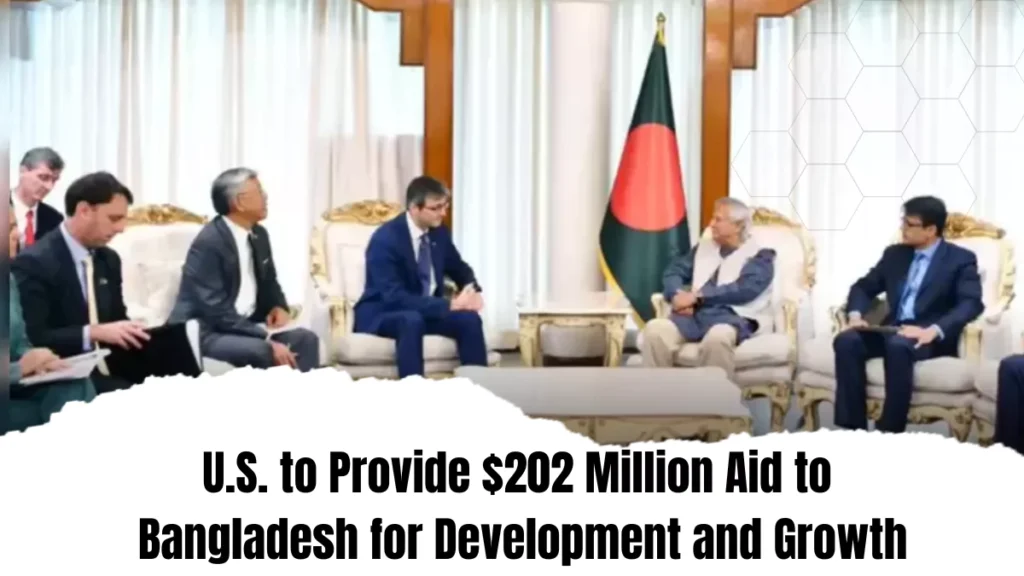
Dhaka, September 15, 2024 – The United States has committed $202.25 million in aid to Bangladesh to support its development, empower youth, strengthen democracy, and expand economic opportunities. This aid is part of a broader collaboration between the U.S. and Bangladesh to enhance growth, institutional reform, and resilience in the South Asian nation.
The Development Objective Grant Agreement (DOAG), signed between USAID and Bangladesh’s Economic Relations Division, outlines the allocation of this grant towards three key areas: good governance, economic opportunity, and resilience. The agreement was signed by AKM Shahabuddin, additional secretary of the Economic Relations Division, and Reed J. Aeschliman, USAID’s mission director in Bangladesh.
U.S.-Bangladesh Partnership Through USAID
The U.S. Agency for International Development (USAID) has been a significant contributor to Bangladesh’s development efforts. Under the DOAG, USAID has pledged a total of $954 million for the period between 2021-2026, with $425 million already disbursed prior to this recent commitment. USAID’s assistance covers a range of sectors, including economic development, social resilience, and human opportunity.
This new aid comes as Bangladesh Nobel Laureate Professor Muhammad Yunus, now serving as the country’s interim Chief Adviser, requested international support for rebuilding and reforming Bangladesh. The U.S. delegation, led by Brent Neiman, Assistant Secretary for International Finance, and Donald Lu, Assistant Secretary of State for South and Central Asian Affairs, affirmed their commitment to assist Bangladesh in this transitional phase.
Aims Behind the $202 Million Aid to Bangladesh
The U.S. aid focuses on:
- Strengthening democratic governance and institutions
- Enhancing economic and trade opportunities
- Improving health services
- Empowering youth through various programs
These efforts aim to promote a more inclusive and equitable future for the people of Bangladesh, with a focus on building institutional capacities and driving sustainable growth.
Implications for Bangladesh’s Future
This aid package is expected to bolster Bangladesh’s economy, enhance institution-building, and promote democracy. By fostering stronger political and economic ties, the U.S. aims to support Bangladesh’s socio-economic development and climate resilience. It also signifies the strengthening of bilateral relations between the two nations.
The U.S. delegation met with several high-ranking officials in Bangladesh, including Foreign Adviser Md Touhid Hossain and Finance Adviser Salehuddin Ahmed, to discuss strategies for propelling Bangladesh’s growth through international partnerships and engagement with financial institutions.
Key Summary of $202 Million Aid to Bangladesh:
- $202.25 million in U.S. aid has been committed to Bangladesh to support development, governance, and youth empowerment.
- This is part of USAID’s larger $954 million commitment to Bangladesh for 2021-2026.
- The aid will focus on promoting democratic governance, economic growth, and resilience.
The U.S. delegation reaffirmed support for Bangladesh’s institution-building efforts during meetings with high-ranking government officials.
Read- VP Jagdeep Dhankhar Inaugurates ‘Constitution Temples’ in Maharashtra
The U.S. aid aims to support development, strengthen democratic institutions, and expand economic opportunities in Bangladesh.
The U.S. has pledged a total of $954 million for Bangladesh through USAID between 2021-2026.
The aid will be allocated to improve governance, enhance economic opportunity, and promote resilience in Bangladesh.
The agreement was signed by AKM Shahabuddin, additional secretary of Bangladesh’s Economic Relations Division, and Reed J. Aeschliman, USAID mission director.
The aid aims to empower youth, strengthen democracy, improve health services, and support economic growth in Bangladesh.
